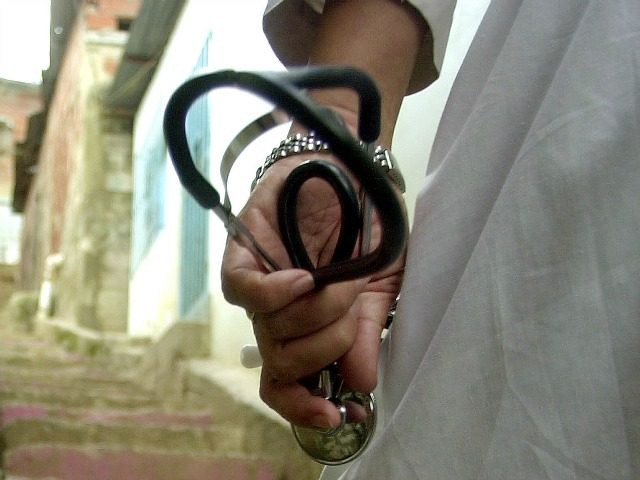A group of unnamed Cuban doctors forced to work without pay in Venezuela filed a lawsuit Monday against Petróleos de Venezuela (PDVSA), the state’s oil company, arguing that the socialist state paid the Castro regime for their services in oil and owe them a fair salary.
Cuba has enriched itself for decades through its slave doctor system, sending thousands of doctors abroad to friendly countries to work in impoverished and dangerous areas. The countries pay the communist regime directly, netting Havana an estimated $11 million a year, more than its tourism industry. The doctors see only a “living stipend” out of these profits, which many say are akin to slave wages and insufficient to cover their daily living expenses. Cuba also bans doctors’ families from leaving the country and traveling with them on their missions.
Venezuelan attorney Joaquín León filed the most recent lawsuit related to Cuba’s slave doctor trade this week in Miami to Venezuela’s legitimate Supreme Tribunal of Justice (TSJ), or Supreme Court. The TSJ operates outside of the country after dictator Nicolás Maduro expelled the justices from the country for refusing to comply with unconstitutional demands.
León explained that PDVSA is the defendant in the case because the entity made the payments to Cuba for the doctors, as Venezuela’s failed economy long ago ran out of the cash necessary to make such payments. The program launched in 2003 under dictator Hugo Chávez and is officially “administered” through PDVSA, not through Venezuela’s health ministry.
“PDVSA makes the payments, covers the agreements so that these programs continue,” León explained, adding that the doctors are not merely alleging that their living stipends were unreasonable, but that they failed to receive even the measly stipends in the contract between Venezuela and Cuba.
The doctors – who have chosen to remain anonymous and not state their number for fear of retribution from the Cuban government – are suing for exploitation of labor and “deprivation of fundamental liberties.” León referred to the Venezuelan program, officially known as “Mission Deep Neighborhood” (Misión Barrio Adentro), as “a modern system of slavery.
As the suit is a class action, it is possible for more doctors to join the current number should they have similar experiences.
Attorneys for the doctors in question say as much as $28 billion in salaries remains in the hands of the Cuban regime. They are demanding the court freeze $3.6 billion in payments to the Cuban government while the trial occurs to ensure that th doctors will receive at least some payment if the court finds in their favor.
The TSJ’s ability to function properly while processing a Venezuelan court case is an open question, as the Supreme Court justices are in exile and the Maduro regime refuses to acknowledge their legitimacy. The court, consisting of 33 justices, established itself abroad in December 2017 following the implementation of the “national constituent assembly,” an illegitimate legislature Maduro created after his party lost control of the constitutionally mandated National Assembly.
The Organization of American States (OAS) has helped the court establish itself. Since then, the court has convicted Maduro for corruption during his tenure and sentenced him to 18 years in prison. To enforce the rule, the court has urged Interpol to issue a red alert for the dictator, though it has not yet accepted the request.
The PDVSA suit is the latest in a string of similar legal actions on the part of Cuban doctors who have managed to escape the government’s medical slavery system. In November, a group of exile doctors in Florida sued the Pan-American Health Organization (PAHO), which operates out of the United States, in U.S. court for its role in facilitating payments to Cuba for the Brazilian medical program Mais Médicos (“More Doctors”), launched under impeached socialist President Dilma Rousseff. PAHO intervened between Cuba and Brazil to prevent Brazil from facing the consequences of violating human rights sanctions on Cuba and processed payments for the thousands of Cuban doctors forced to work in the country.
The doctors suing in Florida allege that PAHO owes them $74 million in wages that ended up in the hands of the Castro regime instead of the doctors. Sam Dubbin, a lawyer representing the doctors suing PAHO, stated upon the launch of the lawsuit that his clients believe the international medical organization is involved in “human trafficking.”
The first class-action suit in recent memory on the part on enslaved doctors entered Brazilian courts a year ago, alleging similar crimes to that of the U.S. PAHO suit. Over one hundred Brazilian doctors sued Brasilia for their wages and for the right to see their families. The government of President Michel Temer blocked the doctors suing from practicing medicine in the country following the lawsuit, cutting them off of even their “living stipend.”
Cuban slave doctor diplomacy has caused controversy around the world. In Africa, where governments have claimed for years to not be able to afford hiring their large numbers of unemployed local doctors, these doctors have protested government expenditures going to Cuba. In Uganda, local doctors organized protests against importing Cubans to do their jobs without pay. In Kenya, the doctors’ union sued the government to block the importing of Cuban doctors but lost the suit in June.

COMMENTS
Please let us know if you're having issues with commenting.